Are google searches different in states with more Trump supporters? A look at searches about gender, race, and sexuality
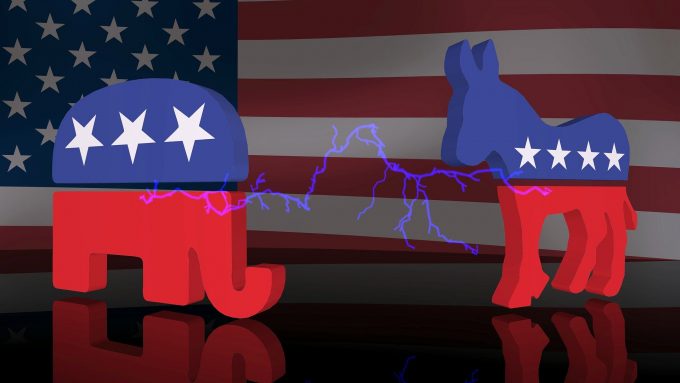
You can tell something about a person—or a state—by their Google searches. This is the premise behind social scientists’ increasing use of Google Trends data. We wondered if people in states with more Trump supporters—“red” states—do different google searches than those in “blue” states—with topics near and dear to liberals searched more often in blue states, and those associated with conservative causes more in red states. Given that issues about race, gender, and sexuality are often the focus of political debates, we looked at searching on topics related to these issues.
What We Did
We examined these topics that we thought might be of special interest to liberals or conservatives to see if they were searched on differently according to the proportion of voters in the last election voting for Trump:
- Liberal:
- Me Too
- Sexual Harassment
- Black Lives Matter
- Police Brutality
- ACAB (All Cops are Bastards)
- Conservative:
- Partial-Birth Abortion Act
- Pro-Life
- Gun Rights
- The Confederate Flag
Using Google Trends, we obtained a score on their search index for each of the topics above for each of the 50 states. The search index, a scale from 1 to 100, tells us how common searches on this topic were in this state relative to searches on all other topics in that state (thus implicitly adjusting for the number of people in the state doing searches). We asked for data for 2015 to 2020 to show us something about the recent era where Trump has been a factor.
To compare searches between states that lean more red or blue, we added obtained data on the proportion of each state’s vote that went for Trump in 2016. We also obtained data on the percent of adults in each state who are college graduates so we could control for how well educated a state is when assessing the association between the Trump vote and the search popularity of liberal and conservative topics.
For each search topic, we performed two OLS regression analyses, each of which take the 50 states as units of analysis. One, that we call “unadjusted,” is a simple bivariate association between the percent voting for Trump in a state and the search index. The second is the same except it is multivariate, assessing the relationship between the percent voting for Trump in a state and the search index after adjusting (controlling) for how educated the state is.
Our decision to control for education was based on knowing that, at the individual level, among whites, education affected voting for Trump—those with a college degree were less likely to vote for him. As a result, states with a lower proportion of college graduates showed a higher Trump vote, as you can see in the graph below.
More details on our procedures, as well as sources of our data, are found in the Technical Appendix at the end of this blog post.
What We Found
Me Too
For a number of liberal causes, we found exactly what we expected: The more a state voted for Trump the less popular these liberal issues were as search terms for people in the state. This was true for the term Me Too, referring to women going public on social media that they had been victims of sexual assault. For instance, one of the states with the lowest Trump support was Vermont, with only 30% of Trump voters in 2016. Their search index on “Me Too” was 100, the highest possible score. By contrast, Oklahoma had a high rate of Trump support, with 65% of residents who voted for Trump, and had the lowest search index of 44.
The fact that the adjusted line is less steep than the unadjusted line in the graph below shows that the lower education in Trump-supporting states is part of the reason that their residents search less on this topic. However, the fact that the two lines are only slightly different makes us confident that most of the effect of a conservative population on the popularity of Me Too searches is not explained by lower education. The figure below, thus, is evidence that, as a reflection of their politics, blue state residents were more interested in the Me Too movement than those in red states.
Sexual Harassment
Undoubtedly sexual harassment affects women in every state, but the Sexual Harassment search topic had a lower volume of queries in states with many Trump voters, as the graph below shows. An example of this would be New York, with only 37% of the voting population going for Trump in 2016, but the highest search index for sexual harassment at 81. On the other hand, North Dakota has a high rate of Trump support, with 63% of voters going for Trump in 2016, but the lowest search index of 44. Adjustment for education leads to only a slight reduction in the steepness of the regression line. This follows the same pattern as the Me Too graph, and reflects the fact that sexual assault and sexual harassment are seen as more important issues in more liberal areas, and most of this relationship is present even when holding education constant.
Black Lives Matter
One needs only to look at the campaigns for president in 2020 to see that Republicans favor the Black Lives Matter movement as less than Democrats. Examining searches for Black Lives Matter, we found this search topic less popular in states with high Trump support, as the figure below shows. In Vermont, there was a very low rate of Trump support (30% were Trump voters), and consistent with our hypothesis, they had the top search index of 100. At the other end of the spectrum, in South Dakota where 62% of the population voted for Trump in 2016, the index for BLM is lowest at a score of 36. When adjusted for education, the slope is slightly less steep, but education does not explain much of the association, as the graph below shows.
Police Brutality
Long before the term “Black Lives Matter” was coined, Black communities often complained about police brutality, so we examined this as a search term as well. Although it refers to basically the same issue as Black Lives Matter, it has an even steeper line. It has a very strong negative relationship with Trump Votes with an unadjusted slope of -0.952 unadjusted and an adjusted slope of -0.816 after education is controlled. The graph below shows the relationship.
ACAB
Acronym ACAB, for “All Cops Are Bastards,” was popularized by some protesters after the killing of George Floyd by police. A strong, some might say hyperbolic, statement about police brutality, it too shows a negative relationship with Trump Votes. Although the correlation is not as strong as for police brutality, it too shows that those in states with low Trump support searched on ACAB more, as the graph below shows. Controlling for education has almost no effect on the association, because this topic is not as strongly associated with education as some.
Partial-Birth Abortion Ban and Pro-Life
Decades ago, opinions on abortion were uncorrelated with whether people voted Democratic or Republican. Among both ordinary citizens and politicians, there were both Democrats and Republicans among those who were strongly pro-life, and both parties were well represented among those who were pro-choice. But starting a couple of decades ago, opposition to abortion became strongly associated with voting Republican and it is now espoused by most Republican office holders, including candidate and then President Trump. As seen in the two graphs below, whether adjusted for education or not, states that voted more for Trump search more on the generic search term topic of Pro Life, as well as on the topic referring to a specific piece of anti-abortion legislation, Partial-Birth Abortion Ban Act, which was passed by Congress and signed by President George W. Bush in 2003, and upheld by the Supreme Court in 2007. As an example of the positive correlation, Hawaii had a very low percentage of Trump voters, 30%, and also had the lowest search index of 33 for Partial-Birth Abortion Ban Act. Illustrating the red/blue state differences on Pro-Life searches, in Nebraska, a very high 59% of people voted for Trump, and they had the top Pro-Life search index of 100. By contrast, Delaware, where a relatively smaller 42% voted for Trump, had the lowest search index of 60.
Gun Rights
Another cause embraced by many conservatives is the right to own a wide array of guns. As the graph below shows, we found that searches on this search term are more common in Trump-supporting states, and the relationship is no less steep after controlling education. (In fact, there was no significant correlation, positive or negative, between the percent of a state’s population that was college graduates and searches on gun rights.) As an example of the positive relationship, Wyoming had the highest search index for Gun Rights, 100, and was the highest states in percent voting for Trump, 68%, while Massachusetts was low on both the search index (30) and on percent voting for Trump (33%).
The Confederate Flag
The Confederate Flag is a controversial symbol that, in the view of many liberals, symbolizes support for the white supremacy, including slavery. In states where Trump received more support in 2016, this term was searched for much more. Although the phrase is searched on much less in states with a higher proportion of college graduates, most of the positive relationship between the search index on this term and the Trump vote remains when education is controlled. The states with high search indices on this term are the Southern states that were in the Confederacy, most of which strongly supported Trump. By contrast, conservative Western states, such as the Dakotas, Wyoming, and Idaho that also supported Trump had only moderate levels of search on the term.
Conclusion
We found, as we expected, that Google searches for topics embodying topics of interest to liberals were more common in blue states–those where fewer people voted for Trump in 2016. In general, these are the states that have historically voted more heavily Democratic. We found negative bivariate (unadjusted) relationships between the percent in a state voting for Trump and the search index for each liberal topic we examined: Me Too, Sexual Harassment, Black Lives Matter, Police Brutality, and ACAB (All Cops are Bastards). On all of these, when we controlled for the percent of the state’s population that are college graduates, the relationships were still negative but became smaller (less steep), because states with more college graduates showed more searches on all these terms. However, only a very small portion of the association between Trump vote and searches on these liberal causes was explained by education. We conclude that, even controlling for education, people in blue states search more and people in red states search less for information about these topics that are important causes for liberals.
When it came to topics we thought would pique the interest of conservatives, we found more searches in states where a high proportion voted for Trump. This was true for abortion-related issues: the umbrella identity “pro-life,” and the name of a law, The Partial-Birth Abortion Act, passed in 2003, prohibiting a certain method of abortion. It was also true for searches about and The Confederate flag. Controlling for education explained little or none of these associations.
Elizabeth Balzac is a student at George W. Hewlett High School on Long Island and is the Layout Editor for Hewlett Spectrum Newspaper.
Paula England is Silver Professor of Sociology at NYU.
Andrew Levine is a doctoral student at NYU.
Technical Appendix (More Details on What We Did)
Using Google Trends, we downloaded data on the relative search frequency for each of the topics above for each of the 50 states. When available, we searched on what Google Trends calls topics, all phrases closely related to the topic, rather than precise phrases. (For three of our searches—Pro-Life, Gun Rights, and The Confederate Flag—there was not a topic available Google Trends, so we used the exact phrase.)
For each topic or phrase, Google Trends provides data for each state on the number of searches on this topic/phrase in the state relative to the number of searches in the state on all other topics/phrases, put onto a scale from 1 to 100. By making the measure relative to all other search terms, Google ensures that a state doesn’t get a higher score just because its population is larger or because more people in the state use the internet or use Google as a search engine.
We asked for data for 2015 to 2020 to show us something about the recent era where Trump has been a factor. Working from the data Google Trends provided us with, we created a spreadsheet on which the 50 states defined the rows (units of analysis) and the search topics/phrases defined the columns (variables), with the search index in the cells.
To compare searches between states that supported Trump more or less, we added to our spreadsheet a column on the percent of each state’s vote that went for Trump in 2016. For each search topic, we performed two OLS regression analyses, each of which take the 50 states as units of analysis. One, that we call “unadjusted,” is a simple bivariate association between the percent voting for Trump in a state and the relative search index. The second is from a multivariate regression predicting the search index for the topic from the % voting for Trump in the state after controlling for the % of the state’s population who have a college degree. Our decision to control for education was based on knowing that Trump’s support was greater among those with less than a college degree (especially among whites), and that, as a result, states with a lower proportion of college graduates showed a higher Trump vote, as we showed above. Given this negative association between how educated those in a state are and the percent voting for Trump, we wanted to control for education when assessing the association between Trump support and each topic. We wanted to be sure that the negative association between searches related to a liberal cause and the Trump vote did not result entirely from the fact that more educated people are more likely to search on these topics and to vote against Trump. Accordingly, we estimated the “adjusted” multivariate regression that controlled for the % in the states with college degrees, so we could examine the relationship between the popularity of the search term and the Trump vote while holding education constant.
Unfortunately, for a number of the topics we chose thinking they might be popular with conservatives, Google Trends did not provide an index score for a large number of states (between 10 and 28). Google does not provide a search index number for a state when the number of searches in a state is small enough that they assess the index number to be unreliable. Our inspection of the states with these missing values shows that most are states with relatively small populations. Such states tend to be disproportionately rural and rural areas are generally more conservative. We looked at scatter plots of the data substituting 0s for those missing cases (thinking that a very small number of searches could be approximated by 0), but the 0s seldom were close to the regression line. So, we decided not to use these topics because neither an analysis missing many states nor substituting missing values with 0 seemed appropriate. These topics included Feminazi, reverse discrimination, deep state, and drain the swamp.
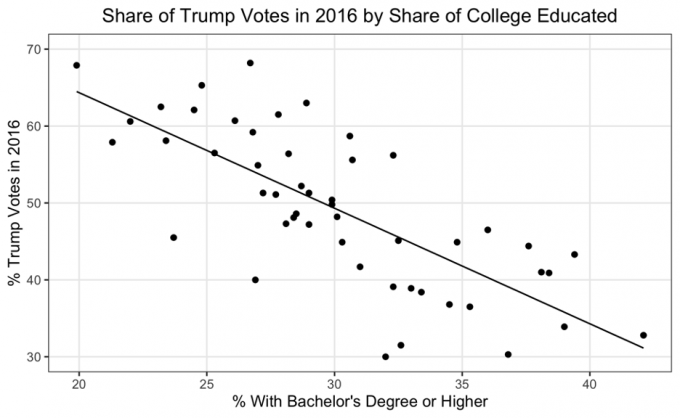
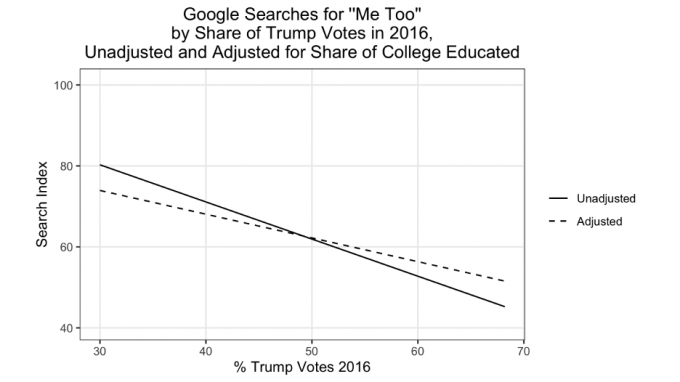
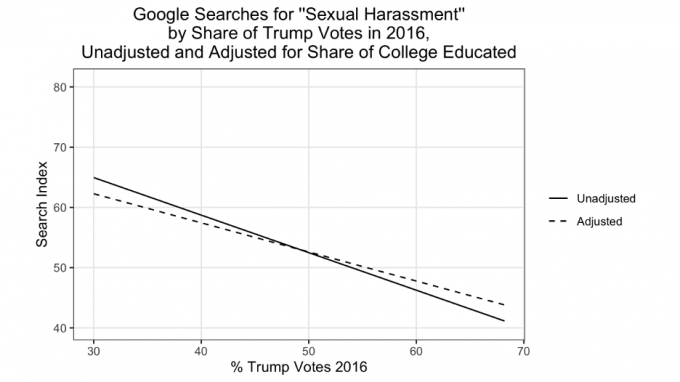
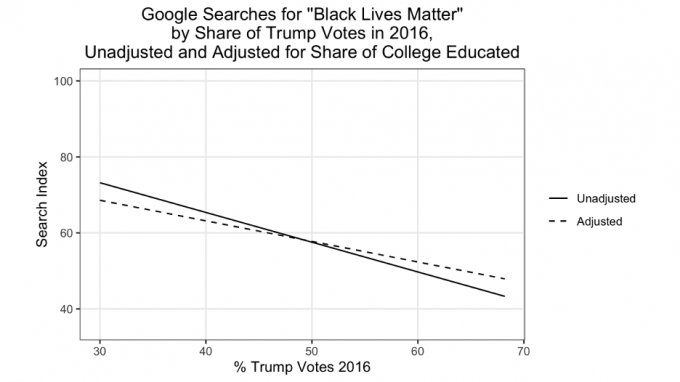
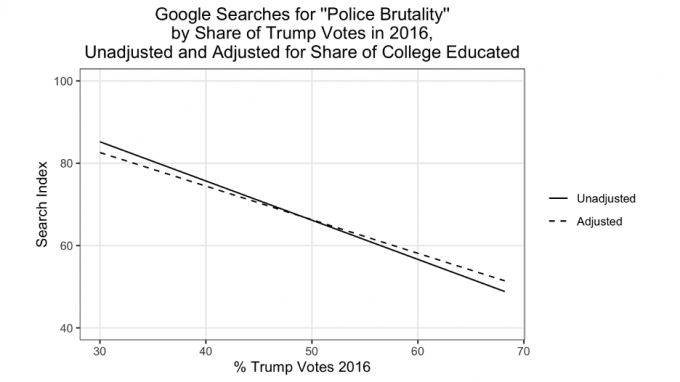
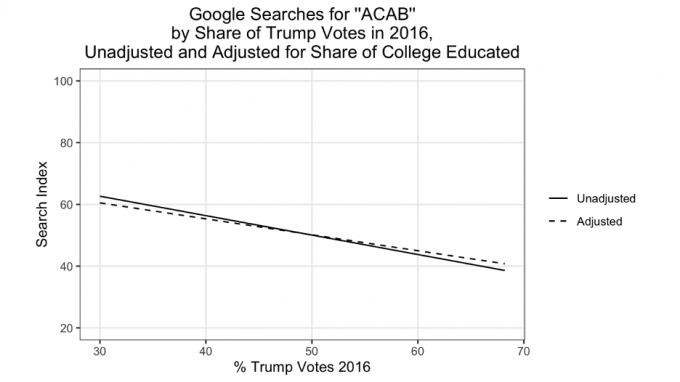
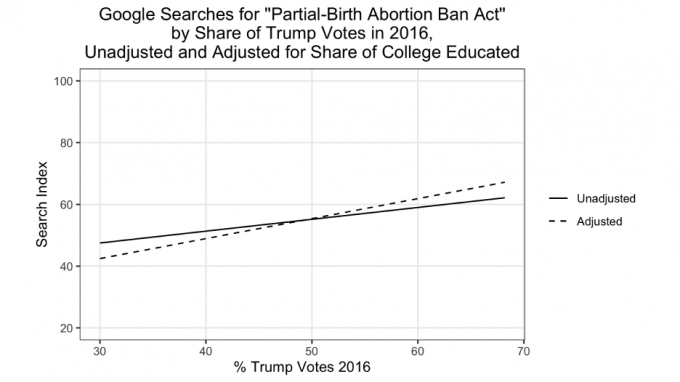
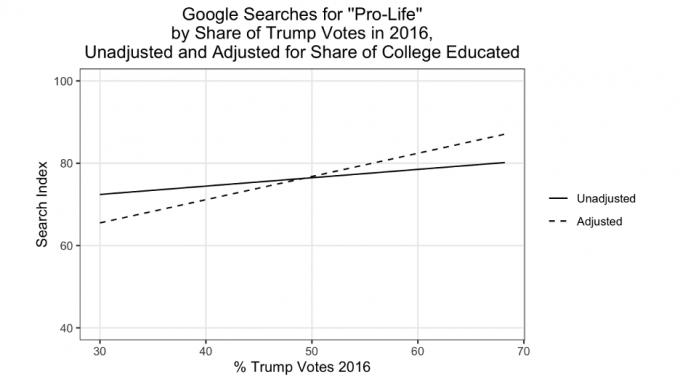
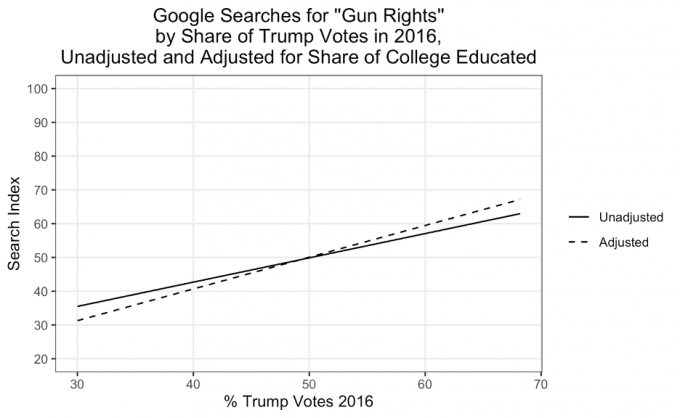
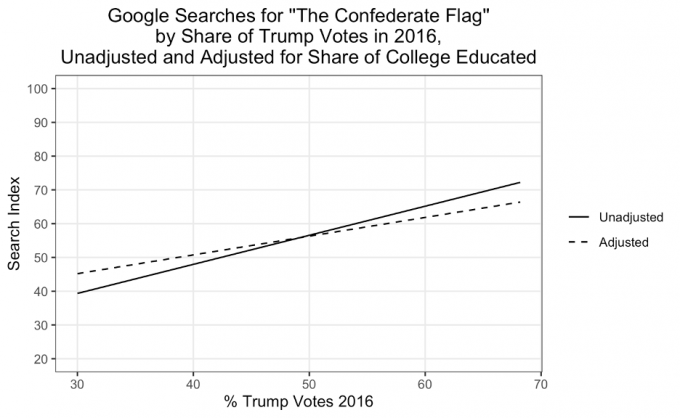

Comments 11
wuxiaworld
September 28, 2020Thanks for the article information of the author, it was very helpful to me. Thanks for this valuable information for all.
Bill Clinton
September 28, 2020Great, I have found great knowledge through your writing. I will take a closer look and introduce some useful information in your article. Thanks very much. wuxiaworld
Roledes
September 30, 2020In order not to sit with academic debts at the end of the semester, you can start doing all the work right now, and if you have any difficulties, you can turn to the service https://expert-writers.net/, where they will help you to cope with any task
Rajesh
October 2, 2020Thanks for saharing the valuable information.
Rajesh
October 3, 2020Great, I have found great knowledge through your writing. I will take a closer look and introduce some useful information in your article. Thanks very much. SSC
Jared Mai
October 3, 2020The site also supplies an excellent and also active assistance service that is ready to respond to quickly and also swiftly to any of your questions and aid with resolving any kind of issue. The support solution on the site, operating in Live Chat, is ready to aid in the hours indicated on the website, as well as you can constantly speak to the email address. In addition, you have the possibility to examine information on frequently asked questions. This is a different section that offers information on the numerous areas gathered on the website. The website additionally has a hotline telephone, which you can also call. And also the casino has its own web pages on social media networks, which will not leave indifferent young individuals of the site. Gambling enterprises can only be made use of by persons over 18 years of age who are responsible for themselves. In the event of a gaming dependency, the site offers three web links, on which there is a site where you are ready to help with your troubles. Generally, www.spinsbest.com still has space to grow as well as exactly how to create, however already for that short time of its existence, good progress as well as development shows up. So maintain it up!
essaysmate
October 13, 2020Need academic essay writing? Find an order page on the homepage of the website and provide all the paper details.
run 3
October 14, 2020COVID-19 has exposed America’s fragile fault lines associated with economic and racial inequality: run 3
happy wheels
October 26, 2020Your article is very useful, the content is great, I have read a lot of articles, but for your article, it left me a deep impression, thank you for sharing.
Biden Tweet
November 11, 2020I think that thanks for the valuabe information and insights you have so provided here
play solitaire
April 2, 2021Really I appreciate the effort you made to share the knowledge. The topic here I found was really effective to the topic which I was researching for a long time.